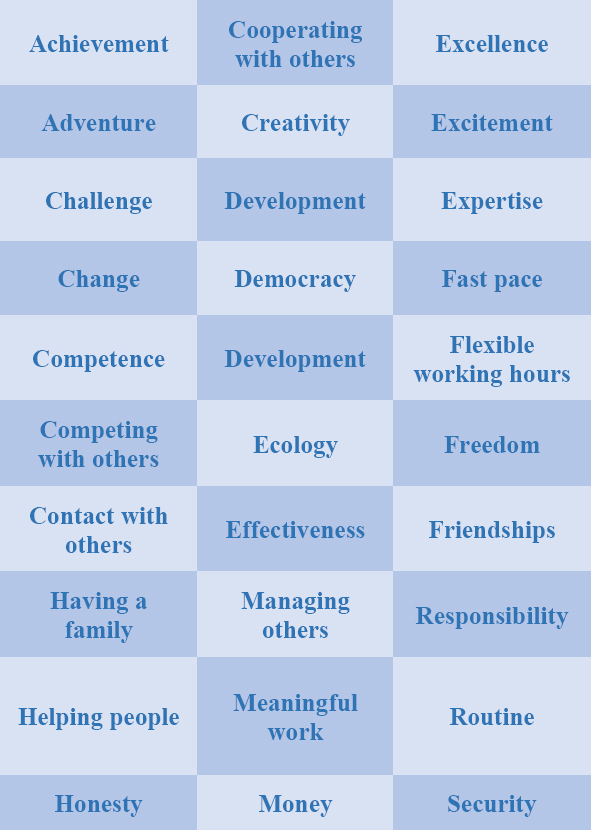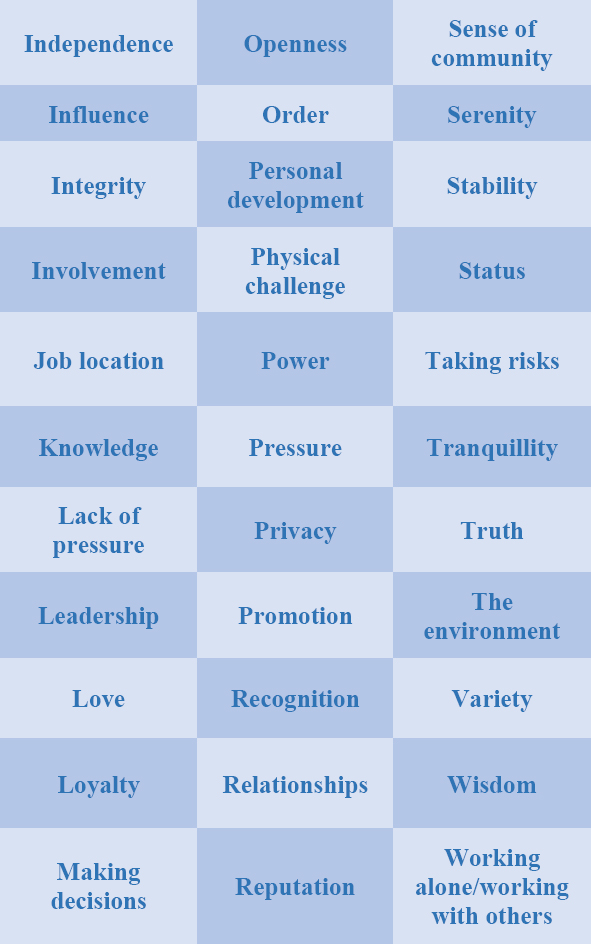CHAPTER 3: WHAT IS IMPORTANT TO YOU IN A JOB?
What is important to you in a job?
Having assessed where you have come from and where you are now, the next step is to identify what’s important to you in a job.
In this chapter you’ll find activities to help you identify:
• Your personal values;
• Your ideal work environment; and
• The non-negotiables.
These activities will help you to better understand your career priorities.
Case study: Kai’s personal values
Kai worked in the head office of a major bank. It was a fast-paced and competitive environment where long hours and presenteeism were the norm.
Kai was promoted on several occasions and four years later he was headhunted by another financial services organisation. Here he headed a special project team. The work ethic meant that Kai left home early in the morning and arrived home late at night. He found it increasingly exhausting, Furthermore, his social life was restricted to weekends and he found it hard to stay in contact with his friendship group.
During one Christmas break, feeling washed out and reluctant to continue the same trajectory in the new year, Kai reflected on his personal values and what was important to him at work. He knew that helping others and making a difference were two of his key values but did not think these sat well with his job in financial services.
He decided to begin job hunting in the public sector and not-for-profit organisations, which he believed would better suit his personal values and lead him to feel happier and more satisfied at work and in his home life.
Identifying your personal values
Values are internal anchors or reference points that serve as moral principles for how we lead our lives. Our values and beliefs drive our behaviour, preferences and priorities. They are the lens through which we reference what is right and wrong, good and bad.
Identifying your personal values and what you hold dear is a useful exercise in self-understanding. When we are feeling stressed or frustrated at work it is often because our personal values are called into question.
Look back at your life-line road activity from the last chapter and consider when you were at your best – what was the work environment like? What were the underlying principles that were at play?
The list on the next two pages gives a wide range of values that may help you pinpoint what is important to you. Feel free to add any other values you may think of. Then, tick the things that are most important to you. Look to highlight eight key values.

Detail what these eight priorities mean to you. This will help you to identify and measure when these values are being met.
1. ___________________________________________
2. ___________________________________________
3. ___________________________________________
4. ___________________________________________
5. ___________________________________________
6. ___________________________________________
7. ___________________________________________
8. ___________________________________________
Consider:
• Which of the values are the most important to you? (You may need time to reflect on your list and to test and refine this.)
Then consider:
• How closely does your work environment fulfil these values?
• How important is it that your personal life and organisation reflect these values?
• What do you want to do if either your personal life or work life are not fulfilling these values?
Your ideal work environment
Having established your work values, the next activity invites you to build on this understanding and to imagine your ideal work environment. To do this, you’ll also need to refer back to the vision you created in chapter 1.
This is a creative fantasy exercise and there are no right or wrong answers.
Visualise your ideal work environment, thinking about your vision and your values, then write down or draw the environment.
Here are two people’s descriptions of their ideal work environment as examples:
• Working in a highly energised team, having variety, opportunity for fun, learning new things and having flexibility over child cover.
• A place that appreciates talent and gives me a chance to shine, to lead a team and to influence and where I have the choice of where I work (office or home).
Your ideal work environment:
The non-negotiables
Now think about what your envisioned ideal work environment says about what you are not prepared to accept in a job.
Here are some examples:
• Working five days a week in the office.
• Working in a highly competitive environment.
• Travelling away from home.
• Having to do lots of overtime.
List your non-negotiables here:
Reflection and action points from this chapter
Defining your personal values and what’s important to you in a job requires time and reflection. The exercises in this chapter are intended to help you identify:
• Your values: what do you stand for?
• What’s important to you in a job: what will motivate you and help you give of your best?
I recommend revisiting your notes from this chapter later to see if what you have written still resonates.

